16.06 NATO's chief is calling Russia's advances in Ukraine the greatest
threat to European security and stability since the end of the Cold War.
In a speech set for later today, NATO Secretary-General Anders Fogh Rasmussen
is expected to say that Moscow's annexation of Ukraine's strategic Crimea
Peninsula is a wake-up call for international partners committed to a free
and peaceful Europe.
An advance copy of Mr Rasmussen's planned speech at the Brookings Institution
think-tank was obtained by The Associated Press.
Rasmussen was to say that NATO must focus on the long-term impact of Russia's
aggression on its own security.
14.40 As European heads of state prepare for the EU summit tomorrow and
Friday, where they will discuss the Ukraine crisis, President Putin is
attempting to fracture EU unity on the issue by raising an inconvenient
historical truth, our Brussels
correspondent Bruno Waterfield reports:
There are growing fears that over the coming days and weeks Russia will play a
divide and rule game to split Europe and the European Union.
Senior European diplomats here in Brussels fear that Vladimir Putin will
respond to Western sanctions by taking retaliatory measures that will focus
on the different national and economic interests at play in the EU.
The Russian president’s main tactic will be to try and split Germany from the
EU pack by threatening to damage its economy, dependent on imports of
Russia’s gas, and by reminding Germans of recent history.
Diplomats point to his annexation of Crimea speech to both houses of the
Russian parliament yesterday as evidence with its unsubtle reminder that
Britain and France, but not the United States or Russia, opposed German
reunification as the Iron Curtain fell in 1989.
"I believe that the Europeans, first and foremost, the Germans, will also
understand me. Let me remind you that in the course of political
consultations on the unification of East and West Germany, [...] some
nations that were then and are now Germany’s allies did not support the idea
of unification, the Russian president said.
"Our nation, however, unequivocally supported the sincere, unstoppable desire
of the Germans for national unity. I am confident that you have not
forgotten this, and I expect that the citizens of Germany will also support
the aspiration of the Russians, of historical Russia, to restore unity.”
His comments alarm European diplomats because they rub the EU’s nose in an
uncomfortable, inconvenient historical truth: Margaret Thatcher and Francois
Mitterrand opposed German reunification, Mikhail Gorbachev and George HW
Bush supported it. Angela Merkel, who grew up in East Germany, is well aware
of this.
14.19 Katerina Kravtsova in Moscow has some added detail on the Crimean
Tatars and the situation they now find themselves in:
Many Crimean Tatars have apparently boycotted the Sunday referendum on
independence, after the former head of the group's unofficial parliament,
Mustafa Dzhemilev, said holding the vote would be illegitimate.
In an interview with Reuters, Mr Dzhemilev said that since the Crimean
Tatars were vocal supporters of Ukraine's integrity, he feared there would
be attacks on them when Crimea joined Russia.
Last Sunday, police found body of Reshat Ametov, a Crimean Tatar, who is
believed to have been tortured and killed. His relatives said Mr Ametov
disappeared after he took part in a rally in Simferopol, which demanded an
end to Russia's interference in Ukraine.
Human Rights Watch called on the Crimean authorities to investigate the
case.
At the same time, President Vladimir Putin promised on Tuesday to observe
the rights of Tatar population in Crimea and make Tatar an official language
of the peninsula along with Russian and Ukrainian.
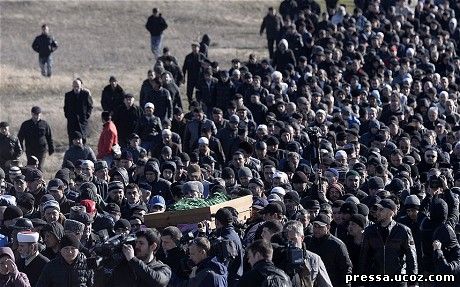
Members of the Tatar community at the funeral of Reshat Ametov
13.36 Russian state news agency Ria Novosti is carrying the ominous
report that Crimean Tatars - who make up 15 per cent of the region's
population and are heavily pro-Kiev - are
to be forced off their lands under plans by the Crimean authorities.
Crimean Deputy Prime Minister Rustam Temirgaliyev reportedly said in an
interview with the agency that the Tatars have been told to leave some of
their lands and move to allocated plots, raising fears of ethnic cleansing
among the minority group.
The Tatars were deported to Central Asia by Stalin 70 years ago and on their
return to their historic homeland in the 1990s were unable to reclaim their
properties. As a result, many have settled on unclaimed lands, resulting in
long-simmering land disputes which now threaten to turn increasingly ugly
under the new status quo.
Mr Termirgaliyev was quoted as saying that Tatars could receive senior
positions in the new government, in an apparent attempt to soothe ethnic
tensions in the region. But on the ground, most Tatars are fearful of what
the future holds for them in a Russian Crimea.
12.55 Prime Minister David Cameron has warned that Russia could be
expelled from the G8 over its actions in Ukraine. He told Parliament that G7
nations meeting next week should discuss "whether or not to expel
Russia permanently from the G8 if further steps are taken" by Moscow to
destabilise Ukraine.
12.50 Moscow has by no means been cowed by Washington's military
warnings, with the Russian foreign ministry delivering some tough words of
its own. Katerina Kravtsova in Moscow reports:
Russia's foreign ministry has issued a statement accusing Western countries
of indulging a coup d'etat in Ukraine last month and violating their promise
to respect Ukraine's sovereignty under a security assurance agreement.
The agreement was signed by Britain, the US and Russia in 1994 after
Ukraine's commitment to give up its nuclear arsenal. Western countries said
recently that Russia had violated the pact by threatening to send troops to
Crimea.
"In the context of the situation in Ukraine, some of our partners reminded
Russia about its commitments under the 1994 agreement,” the foreign
ministry's statement said.
It went on: "How should we react to the almost constant patrol of the
Maidan by Western envoys ... and the EU and US statement that they do not
recognise the legitimately elected president as their partner?”
Many Western politicians, including Baroness Ashton, the EU foreign policy
chief and John Kerry, the US secretary of state, visited the Maidan from
last November, when the protests started, to February, when President Viktor
Yanukovich was ousted.
Meanwhile, Russia's representative to Nato, Alexander Grushko, said Russian
soldiers did not participate in Tuesday's storming of a Ukrainian military
base in Ukraine. "Investigation of the incident is underway, those guilty
will be punished,” he said, according to the Russian news agency Interfax.
12.40 In Vilnius, Lithuania, visiting US Vice-President Joe Biden has
some strong words for Vladimir Putin. After meeting the presidents of Latvia
and Lithuania, he warned Russia was on a "dark path" to isolation,
and told reporters that the US was ready to respond to any aggression
against NATO allies.
There are, he cautioned, "growing costs that come with naked aggression".
Yesterday Mr Biden raised the spectre of an increased US military presence in
the Baltics, in order to reassure regional allies fearing Russian military
belligerence.
Meanwhile both Russia and the US engaged in military posturing in the region.
The Russian air force began large-scale aviation exercises in western
regions today, Interfax news agency reported, while the US warship Truxtun
embarked on a one-day military exercise with Bulgarian and Romanian navies
in the Black Sea. While the "routine" Black Sea war game was
scheduled before the Ukraine crisis, according to US officials, the echoes
of Cold War-era standoffs are ringing ever louder.
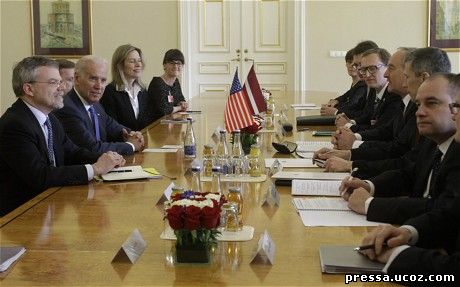
US Vice-President Joe Biden meets Baltic leaders in Vilnius, the
Lithuanian capital
12.15 Vitaly Klitschko, the Ukrainian boxing champion turned opposition
leader, has called for troops loyal to Kiev to withdraw from Crimea "temporarily"
as they are surrounded, Roland Oliphant reports from Sevastopol.
11.59 There are reports that Russian forces have also taken over the
Ukrainian military base in Perevalnoye, near the Crimean capital of
Simferopol, encountering no resistence. Though the details of the situation
have yet to be confirmed, images from the scene indicate it has indeed been
seized.
11.51 The Telegraph's Roland Oliphant is outside the Sevastopol
headquarters of the Ukrainian navy, which has been seized by Russian and
pro-Russian forces. He reports:
Early this morning, so-called civilian "self defence" men -
pro-Russian militia - entered the base unarmed but backed by fully armed
Russian regulars. They told the Ukrainians to quit the base. The Ukrainian
naval commander, Sergei Haiduk, was apparently detained, put in a car and
driven away by these pro-Russian forces. There is no word on where he is.
The Ukrainian defence ministry claims he was led away in handcuffs.
The admiral in command of the Russian Black Sea Fleet is apparently inside
the base negotiating the surrender of the final hardcore of Ukrainian troops
who are refusing to leave. But many Ukrainian servicemen and women are
already packing their bags, dressing in civiliian clothes and leaving
through the back gates, which is guarded by Russian troops and already has
the Russian flag flying over it.
One Ukrainian servicewoman, who declined to give her name, was standing
outside with a bag containing her uniform and personal effects, waiting for
her officer husband, who was still in the base, to join her. She said
although she was born in Russia and was a native Russian speaker she would
rather move to mainland Ukraine than live in what is now the Russian
Federation. The weekend's referendum, she told The Telegraph, had been a
farce.
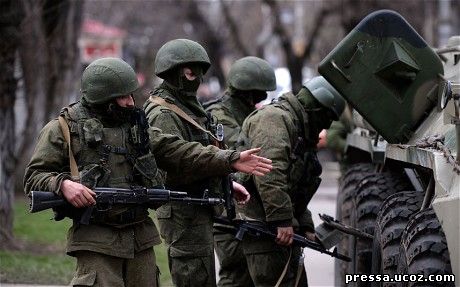
Russian troops at the Ukrainian naval base in Sevastopol
11.08 The world's attention is centred on Crimea but elsewhere in
Ukraine, other Russian-leaning regions threaten to head down a similar path.
In the eastern city of Donesk, the Ukraine parachute battalion is engaged in
a cat and mouse game with its own population as it deploys to the Russian
border. Damien McElroy, the Telegraph's correspondent in Donetsk,
reports:
Since running into a roadblock by a pro-Russian group on Sunday night at a
remote railway crossing, they have been cutting across country to move
forward. Three battalions got through but the one I spoke to got stuck and
has made camp.
11.03 Pro-Russian militants and Russian forces claim to have captured
the head of the Ukrainian navy during this morning's takeover of the naval
HQ in Sevastopol. "He was blocked and he had nowhere to go. He was
forced out and he has been taken away," Igor Yeskin, a representative
of the Russian forces at the scene, told reporters. There has been no
confirmation or comment from Kiev as yet.
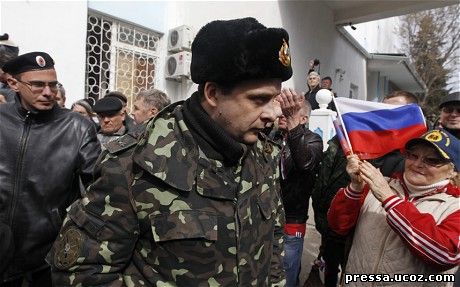
Ukraine servicemen did not resist Russian forces who took over naval
base in Sevastopol
10.45 Further entrenching the Kiev-Crimea standoff, the Crimean
regional prime minister has announced that he will not allow the Ukrainian
defence minister and deputy prime minister into the region, to which they
have been dispatched on an urgent mission as Russian and pro-Russian forces
begin to seize Ukrainian military facilities.
"No one is waiting for them in Crimea. No one will let them into Crimea
and they will be sent back," Sergei Aksyonov said in Moscow, according
to Interfax news agency.
10.23 As military and paramilitary forces dance in Crimea, in Moscow,
the legal machinery that is to bring the region back under Russian control
is grinding into action. Katerina Kravtsova, the Telegraph's
correspondent in Moscow, reports on today's developments in the Duma:
Russia's lower house will adopt a law that would determine status and
boundaries of Crimea and Sevastopol as parts of Russia by Friday, the State
Duma speaker, Sergei Naryshkin, has said at a meting with Crimean leaders.
The Duma is also intended to ratify a treaty on the annexation of Crimea
signed Tuesday by President Vladimir Putin and the peninsula
representatives, after the Constitutional Court will check if the treaty
meets Constitutional norms. Naryshkin, however, said he had no doubts the
court would make a favourable decision later today, with the ratification
issue being put on tomorrow's session agenda.
All the deputies came to Wednesday Duma session wearing black-and-orange
ribbons, a symbol of Russia's military glory, and hailed Crimean
representatives as heroes.
"Crimea and Sevastopol are together with Russia again, and today the
majority of Crimean delegation came to the State Duma,” Mr Naryshkin said,
opening the session, with the rest of the house applauding him vigorously
and shouting: "Crimea, Russia, Putin!” Then Russian national anthem sounded.
Speaking to the parliament, leader of the Communist Party, Gennady
Zyuganov, compared Russia's annexation of Crimea with the country's victory
in the World War II in 1945.
"When I have seen those happy faces of Crimean residents and Russian people
... I had a feeling of delight for the third time in my life. The first time
I had it in 1945, the second – when [Yury] Gagarin took a journey into outer
space, and I have it now when Crimea came back to the Russian soil,” he
said.
Speaking about a Tuesday incident at a Ukrainian army base in Crimea that
led to death of a Ukrainian soldier who was apparently shot dead as
pro-Kremlin forces stormed the facility, Mr Naryshkin said it was a "provocation
similar to those that took place on Maidan."
"This is another dirty story with snipers,” he said.
10.15 Ukraine's defence minister, Igor Tenyukh, is rushing to Crimea in
an attempt to prevent the situation unravelling further, as pro-Russian
forces begin a takeover of military facilities held by Kiev.
Prime Minister Arseny Yatseniuk has ordered the first deputy prime minister
and the defence minister to fly to Crimea to "resolve the situation"
in peninsula, now under the control of Russian forces.
Ostap Semerak, a senior minister, told a meeting of the cabinet that Vitaly
Yarema and Mr Tenyukh would be charged with "ensuring the conflict does
not become military in nature".
10.05 Ukrainian servicemen are walking out of the country's naval
headquarters in the Black Sea port of Sevastopol after it was stormed by
hundreds of Crimean militia loyal to Moscow. Kiev has lost its grip on the
heavily pro-Russian region after it voted at the weekend to split from
Ukraine and President Vladimir Putin yesterday announced its reincorporation
into the country it was a part of until 1954.
The killing of a Ukrainian soldier in an attack on a military base yesterday
had raised fears that the transfer of military facilities to Russian control
would be bloody. But today, Russia appears to be standing by assurances it
will let Ukrainian forces leave Crimea peacefully, and Kiev seems to have
relinquished all hopes of resistance.
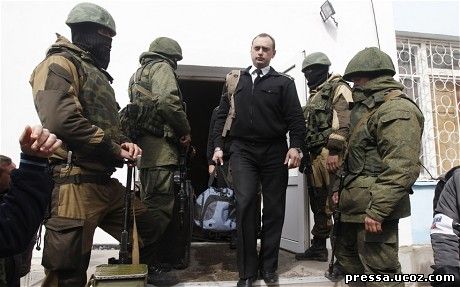
09.50 Good morning from London, Moscow, Donetsk and Sevastopol,
and welcome to our live coverage of today's developments in Ukraine, where
tensions are continuing to escalate following Russia's announcement
yesterday of the annexation of Crimea.
The Black Sea peninsula is on the brink as clashes between Ukrainian troops
and pro-Russian forces threaten to erupt into wider violence. Several
hundred Crimean "self-defence" militia have stormed the Ukrainian
navy's headquarters in Sevastapol, the strategically important port city
where Russia's Black Sea fleet is also based.
Moscow is believed to have given the assurance that Ukrainian troops will be
allowed to leave Crimea peacefully, after the heavily ethnic Russian region
voted overwhelmingly in a referendum to split from the rest of Ukraine and
be incorporated back into the Russian territory it belonged to until 1954.
But pro-Russian forces were apparently behind an attack on a Ukrainian
military base yesterday which killed at least one man, a Ukrainian soldier.
The authorities in Crimea have blamed Pravy Sektor, a radical right wing
group which was one of the more militant elements of the disparate
EuroMaidan movement, for the killing, though this does not appear to be a
very plausible explanation.
More details to follow.
